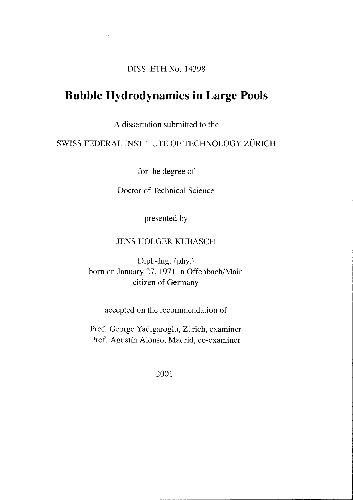Kubasch J.H.
This thesis presents extensive and detailed information about two-phase flow in large pools, obtained from local measurements. The data give a better understanding of two-phase flow under pool scrubbing conditions, i.e., injection of high air flow rates through a single nozzle into large water pools. The experiments were carried out in the context of severe accident research for advanced nuclear power plants.The pool was 1 m in diameter and pool depths up to 3 m were investigated. Air was injected through a single nozzle (diameters of 5,10, and 20 mm) at the bottom. The flow rate was varied between 0.42 and 3.33 dmn/s. The upper limit was set to minimize interactions between the two-phase flow and the walls, evidenced by oscillation of the entire bubble plume. Collected without strong plume oscillations, the results are also applicable to pools with diameters larger than 1 m.The local measurements were performed with a double optical sensor and a hot-film anemometer. Void fraction, bubble and water velocity, and bubble chord length distributions were measured. Signal processing and the calibration of the sensors are discussed in the first part of the work.The two-phase flow area in the pool was separated into a zone of flow establishment (ZFE) close to the nozzle and a zone of established flow (ZEF) further downstream. In the ZFE, either large individual bubbles or jets were observed at the nozzle exit, depending on the air flow rate and the nozzle diameter. The bubble plume in the ZEF is buoyancy driven and the initial momentum of the injected air plays no significant role. This was shown by tests at constant air flow but with different nozzle diameters: The variation of the void fraction and of the bubble velocity along the pool centerline depended only on the air flow rate and was practically unaffected by the nozzle size.Void fraction, bubble and water velocity radial profiles collected at different elevations provided information about the expansion of the bubble plume in the horizontal direction. The profiles were fitted with Gaussian curves and their maximum and width were determined. The data show that a bubble plume consists of a bubble core and an entrained water flow area that expands further than the bubble core. The bubbles rise in the entrained water flow, and so the bubble velocity is considerably higher than that of individual bubbles in stagnant water. However, the mean relative phase velocity determined from the bubble and water velocity measurements was higher than that of individual bubbles in stagnant water. Furthermore, the relative velocity was also not constant along the pool diameter. The fact that the bubbles rise typically in swarms through the pool and not as single bubbles may explain these observations.Bubble chord length distributions were fitted with log-normal distributions. The data indicate that bubble breakup is dominant over bubble coalescence in a bubble plume.A semi-empirical bubble plume model was used to describe globally the flow. The model considers water entrainment, the relative phase velocity, and the different rates of expansion of the entrained water flow and of the bubble core. The empirical parameters that are required for the model were derived from the experimental data. Similar models are used for large plumes in lakes in relation to venting phenomena. However, under pool scrubbing conditions, the air is injected with higher momentum and the void fraction is higher. The empirical parameters obtained in the present work are comparable to the results from other experiments related to lake venting. For the two-phase flow situations studied here, good agreement was found between the experiments and model predictions. It points out, that the bubble plume model is applicable to describe the bubble hydrodynamics in large pools under pool scrubbing conditions. | |

Reviews
There are no reviews yet.